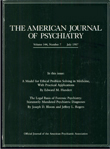Lower levels of nucleoside triphosphate in the basal ganglia of depressed subjects: a phosphorous-31 magnetic resonance spectroscopy study
Abstract
OBJECTIVE: The purpose of this study was to evaluate whether the concentration of beta-nucleoside triphosphate is lower in the basal ganglia of depressed subjects. METHOD: In vivo 31P magnetic resonance spectra were acquired from a 45-cm3 region surrounding the basal ganglia of 35 unmedicated depressed subjects and 18 comparison subjects. RESULTS: beta-Nucleoside triphosphate, which arises primarily from beta-ATP, was 16% lower in the depressed subjects than in the comparison subjects. CONCLUSIONS: The low level of beta-nucleoside triphosphate is consistent with an abnormality of high-energy phosphate metabolism in the basal ganglia of subjects with major depression.



